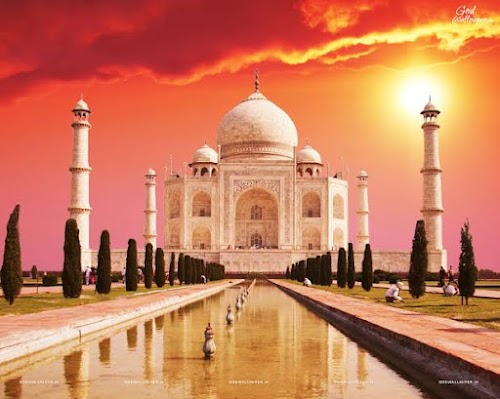
Discover Incredible Places in Agra
Explore our handpicked collection of breathtaking destinations across India
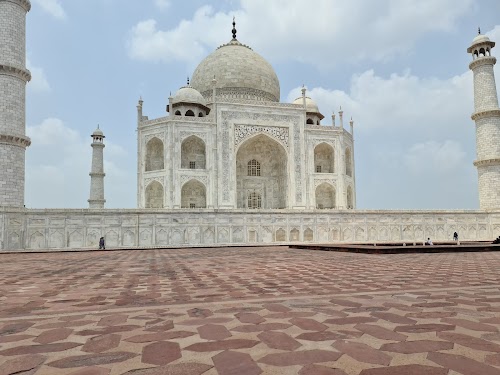
Taj Mahal
The Taj Mahal is an ivory-white marble mausoleum on the south bank of the Yamuna river in Agra, India. It was commissioned in 1632 by the Mughal emperor Shah Jahan to house the tomb of his favorite wife, Mumtaz Mahal. The Taj Mahal is widely recognized as one of the world's most beautiful buildings and a symbol of eternal love. It is a UNESCO World Heritage Site and one of the New7Wonders of the World. The complex includes the main mausoleum, a mosque, a guest house, and extensive gardens. The intricate marble inlay work, calligraphy, and pietra dura decorations are breathtaking. Visitors are captivated by the symmetrical design and the serene atmosphere.
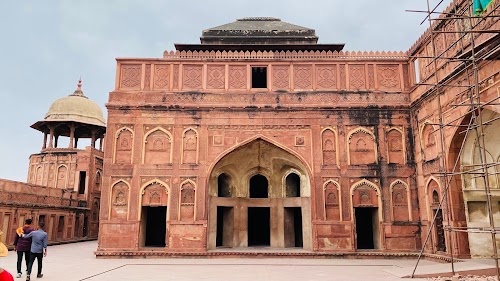
Agra Fort
Agra Fort, a UNESCO World Heritage site, is a majestic red sandstone fort located in Agra, India. It showcases a blend of architectural styles, primarily Mughal and Hindu. Within its massive walls lie palaces, audience halls, mosques, and gardens, each echoing the grandeur of the Mughal empire. The Jahangiri Mahal, built for Akbar's Rajput wife, exhibits intricate carvings and spacious courtyards. The Khas Mahal, with its delicate marble work and stunning views of the Taj Mahal, served as Shah Jahan's private residence. The Diwan-i-Aam and Diwan-i-Khas were used for public and private audiences respectively. The fort's strategic location on the banks of the Yamuna River further enhances its historical significance.
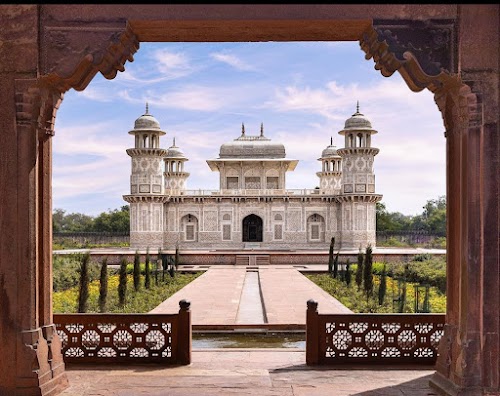
Itmad-ud-Daula
Itmad-ud-Daulah's Tomb, often referred to as the "Baby Taj," is a Mughal mausoleum in Agra, India. Built between 1622 and 1628 by Nur Jahan, the wife of Emperor Jahangir, for her father Mirza Ghiyas Beg, it stands as a jewel of Mughal architecture. The tomb is renowned for its intricate inlay work using precious stones like lapis lazuli, cornelian, and jasper, a technique called pietra dura. The delicate floral designs and lattice screens add to its ethereal beauty. Set amidst charming gardens, the tomb offers a peaceful retreat from the bustling city. Its smaller scale and exquisite craftsmanship make it a must-see for those who appreciate architectural detail and artistry.
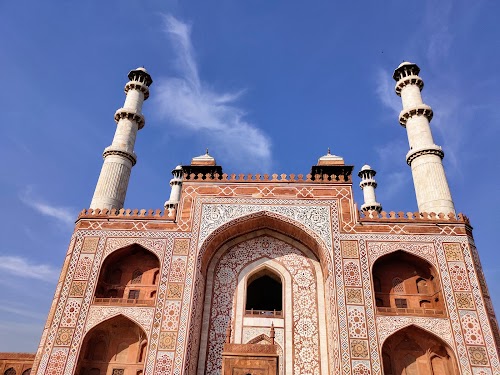
Tomb of Akbar
Akbar's Mausoleum is a magnificent Mughal tomb located in Sikandra, Agra, housing the remains of Emperor Akbar the Great. The tomb showcases a blend of architectural styles, incorporating Hindu, Islamic, Christian, and Buddhist influences, reflecting Akbar's religious tolerance. The four-tiered structure is built primarily of red sandstone and features intricate marble inlay work, exquisite carvings, and beautiful gardens surrounding the main tomb. Visitors can explore the various chambers, courtyards, and gateways, admiring the detailed craftsmanship and grandeur of the complex. The peaceful atmosphere and historical significance make it a must-visit destination for history buffs and architecture enthusiasts.
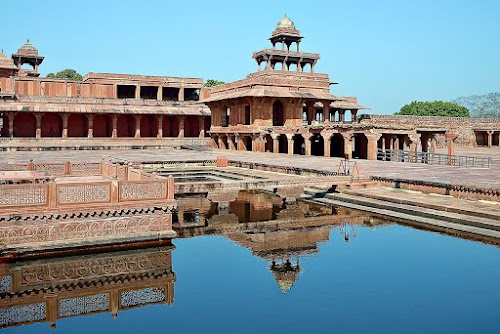
Fatehpur Sikri Fort
Fatehpur Sikri, near Agra, is a mesmerizing UNESCO World Heritage Site showcasing Mughal architecture. Built by Emperor Akbar in the 16th century, this deserted city boasts stunning palaces, mosques, and public buildings, reflecting a blend of Persian, Islamic, and Indian styles. The majestic Buland Darwaza, Jama Masjid, and Panch Mahal are architectural marvels. Explore the intricate details of Diwan-i-Khas and Diwan-i-Am, offering glimpses into the Mughal court. The city's layout and design reveal Akbar's vision of a planned city, though it was abandoned shortly after completion due to water scarcity. A visit to Fatehpur Sikri is a journey back in time, immersing you in the grandeur and artistry of the Mughal era.
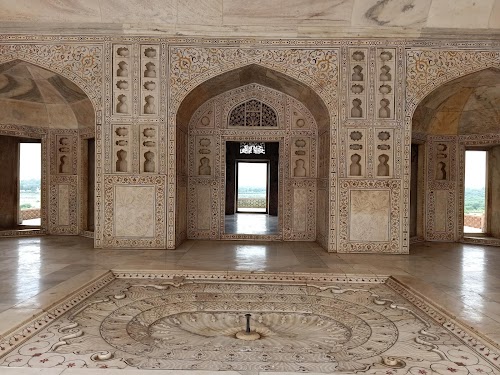
Diwan-i-Khas
Diwan-i-Khas, or Hall of Private Audience, is a magnificent structure located within the Agra Fort complex. Built by Shah Jahan, this ornate hall served as the emperor's private audience chamber where he met with dignitaries and nobles. The most striking feature is the central pillar, intricately carved and inlaid with precious stones, which once supported a silver canopy. The hall's exquisite marble work, pietra dura inlays, and delicate ornamentation showcase the Mughal empire's artistic prowess. Visitors can marvel at the intricate floral designs and calligraphy adorning the walls and imagine the grandeur of the Mughal court.
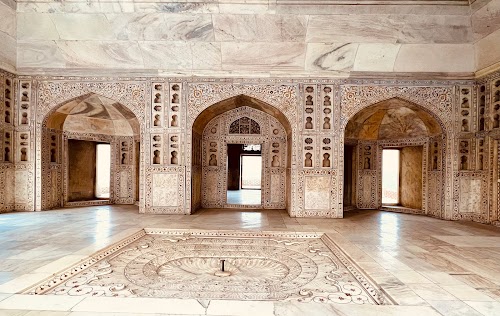
The Shish Mahal (The Glass Palace)
Sheesh Mahal, meaning 'Palace of Mirrors', is an exquisite part of Agra Fort. Its walls and ceilings are intricately inlaid with thousands of tiny mirrors that create a dazzling spectacle when illuminated. The hall was used by Mughal royalty as a summer retreat. The reflective surfaces would shimmer in the candlelight, creating an illusion of stars and offering a cool respite from the summer heat. The lower level, once a dressing room, features fountains and channels that likely provided cooling water. The interplay of light and shadow, combined with the intricate glasswork, makes Sheesh Mahal a truly mesmerizing experience.

Wildlife SOS - Elephant Conservation and Care Center
Wildlife SOS in Agra is a sanctuary dedicated to rescuing and rehabilitating sloth bears, previously exploited for dancing. Visitors can witness these bears enjoying their natural behaviors in a safe and enriching environment. The center offers educational tours that provide insights into the cruel practice of dancing bears and the organization's efforts to protect them. Learn about the bears' individual stories, their rescue, and the ongoing care they receive. The facility also houses elephants rescued from similar situations of abuse and neglect.
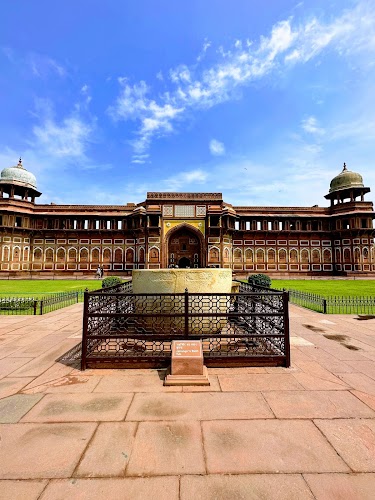
Jahangir Palace
Jahangir Palace, a remarkable structure within the Agra Fort, showcases a blend of Hindu and Islamic architectural styles. Commissioned by Akbar, it served as a residential palace for his son, Jahangir. The palace features intricate carvings, spacious courtyards, and impressive gateways. Highlights include the Jahangiri Mahal, the largest private palace within the fort, known for its majestic façade and elaborate interiors. Visitors can explore the palace's various chambers, including the Khas Mahal, adorned with delicate frescoes, and the Anguri Bagh, a charming courtyard garden. The palace offers a glimpse into the opulent lifestyle of the Mughal emperors and their families.